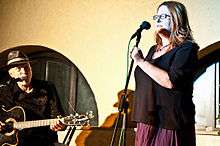Mary Coughlan (singer)
| Mary Coughlan | |
|---|---|
|
| |
| Background information | |
| Birth name | Mary Doherty |
| Born |
5 May 1956 County Galway, Ireland |
| Genres | Pop, rock, New age |
| Occupation(s) | Singer |
| Years active | 1984–present |
| Labels | WEA, East West, Tradition & Moderne |
| Website |
marycoughlanmusic |
Mary Coughlan (born 5 May 1956) is an Irish singer and actress.[1][2]
Background
Mary Coughlan was born in County Galway, Ireland (her father was a soldier from County Donegal). She was the eldest of five and had endured a very erratic youth. She left convent school and started drinking alcohol and taking drugs when she was fifteen. At this age she spent time in a mental hospital. After time in hospital and a belated graduation, Coughlan decided to leave home. In the mid-1970s, she moved to London, England, where she married Fintan Coughlan and had three children. In 1981, she left her husband and took custody of her children. In 1984, she moved back to her hometown of Galway. On her return to Ireland, when she started to perform in public, she was noticed by Dutch musician and producer Erik Visser.[1]
Musical career

Visser, whose band Flairck was popular in Europe, helped Coughlan record her first album, Tired and Emotional. Visser would go on to become her long-term collaborator. The album sold an unexpected 100,000 copies in Ireland, partly because of an appearance on The Late Late Show. Despite problems, Coughlan continued to reap praise for her recording output on WEA. On Under the Influence (1987) she sang the 1948 Peggy Lee hit "Don't Smoke in Bed" and the Billie Holiday ballad "Good Morning Heartache", as well as Jimmy McCarthy's "Ride On", which reached number 5 on the Irish pop charts in 1987. In 1988 she made her acting debut in Neil Jordan's High Spirits. She lost her record contract with Warner Music Group.
In 1990, she signed with East West Records, which released her third album, Uncertain Pleasures, recorded in the UK and produced by Peter Glenister, former music director for Terence Trent D'Arby. It included compositions by Mark Nevin and cover versions of the Rolling Stones' "Mother's Little Helper" and Elvis Presley's "Heartbreak Hotel." After receiving treatment, it seemed as though Coughlan had landed on her feet again. Sentimental Killer (1992) and Love for Sale (1993) were received well. In 1994, she lent her vocals to A Woman's Heart Vol.2 album with Mary Black and Dolores Keane. She released Live in Galway and in 1997 After the Fall, which became her American debut.
In June 2000, Coughlan took another turn in her career when she presented a series of multimedia shows in Dublin and London celebrating Billie Holiday, a singer whose life had parallels to Coughlan's. Material from these shows was collected on Mary Coughlan Sings Billie Holiday. In April 2001 Long Honeymoon was released and in 2002 Red Blues. She appeared on the RTÉ reality television charity show Celebrity Farm.[3] The House of Ill Repute was released in 2008.[4] She participated in the album Sanctuary with Moya Brennan.
Personal life
After Tired and Emotional, Coughlan faced mismanagement of her career. She lost her car, house, and recording contract with Warner Music. She drank alcohol excessively and was hospitalized more than thirty times. She recovered in 1994 and had two children with Frank Bonadio.[5] A public spat with singer Sinéad O'Connor ensued over Bonadio's affections.[6]
Coughlan has spoken about abortion and the role of women in Irish society.[7] In September 2017, she went to Newstalk so she could walk out of an interview to protest comments made by presenter George Hook about rape victims.[8]
Discography
- Tired and Emotional (Mystery, 1985)
- Under the Influence (Mystery, 1987)
- Uncertain Pleasures (East West, 1990)
- Sentimental Killer (East West, 1992)
- Love for Sale (Demon, 1993)
- Live in Galway (Big Cat, 1995)
- After the Fall (Big Cat/V2, 1997)
- Long Honeymoon (Evangeline 1999)
- Mary Coughlan Sings Billie Holiday (Evangeline, 2000)
- Red Blues (Cadiz/Pinnacle, 2002)
- Live at the Basement (Hail Mary, 2003)
- The House of Ill Repute (Rubyworks, 2008)
- Scars on the Calendar (Hail Mary, 2015)
References
- 1 2 Sullivan, Maireid. "An Interview with Mary Coughlan". Alternate Music Press. Retrieved 18 November 2008.
- ↑ "Mary Coughlan Filmography". Fandango. Archived from the original on 15 June 2011. Retrieved 18 November 2008.
- ↑ "Mary Coughlan is third off Celeb Farm". RTÉ. 10 September 2003. Retrieved 18 November 2008.
- ↑ "Interview with Mary Coughlan". Entertainment.ie. 17 October 2008. Archived from the original on 24 October 2008. Retrieved 18 November 2008.
- ↑ "Mary Coughlan Biography". Deelside. Archived from the original on 6 January 2009. Retrieved 18 November 2008.
- ↑ Harris, Anne (2 April 2006). "Why Sinead O'Connor sent those toxic texts to Mary Coughlan". Irish Independent.
- ↑ "Interview with Mary Coughlan". Tallgirlshorts.net. Retrieved 18 November 2008.
- ↑ "'He should be fired' - Mary Coughlan walks out of live Newstalk show in protest at Hook rape comments". Independent.ie. Retrieved 11 September 2017.
External links
| Wikimedia Commons has media related to Mary Coughlan (singer). |